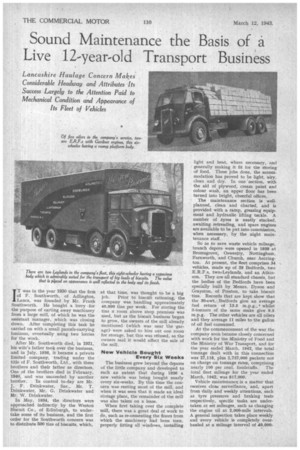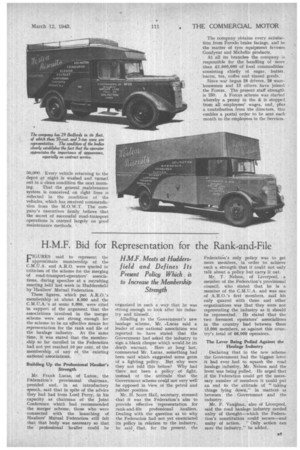Sound Maintenance the Basis of a Live 12-year-old Transport Business
Page 28

Page 29

If you've noticed an error in this article please click here to report it so we can fix it.
Lancashire Haulage Concern Makes Considerable Headway and Attributes Its Success Largely to the Attention Paid to Mechanical Condition and Appearance of Its Fleet of Vehicles
T was in the year 1930 that the firm of F. Southworth, of Adlington, Lanes, was founded by Mr. Frank Southworth. He bought a lorry ,for the purpose of carting away machinery from a large mill, of which he was the assistant manager, which was closing down. After completing this task he carried on with a small parcels-carrying business, eventually using two lorries for the work.
After Mr. Southworth died, in 1931, his wife's father took over the business, and in July, 1936, it became a private limited company, •trading under the title of F. Southworth, Ltd., with three brothers and their father as directors. One of the brothers died in February, 1940, and was succeeded by another
brother. In control to-day are Mr. J. F. Drinkwater, Sm., Mr. T. Drinkwater, Mr. G. Drinkwater and Mr. W. Drinkwater.
In May, 1934, the directors were approached indirectly by the Weston Biscuit Co., of Edinburgh, to undertake some of its business, and the first order for the Southworth concern was to distribute 500 tins of biscuits, which,
at that time, was thought to be a big
job. Prior to biscuit rationing, the company was handling approximately 40,000 tins per week. For storing the tins aroom above shop premises was used, but as the biscuit business began to grow, the owners of the mill already mentioned (which was near the 'garage), were asked to hire out one room for storage, but this was refused, as the owners said it would affect the sale of the mill,
New Vehicle Bought Every Six Weeks The business grew beyond the drpams of the little company and developed to such an extent that during 1936 a new vehicle was being bought nearly every six‘weeks. By this time the concern was renting most of the mill, and when it was seen that it macie an ideal storage place, the remainder of the mill was also taken on a lease.
When first taking over the complete mill, there was a great deal of work to do, such as re-cementing the floors from which the machinery had been torn, properly fitting all windows, installing light and heat, where necessary, and generally making it fit for the storing of food. These jobs done, the accommodation has proved to be light, airy, clean and dry. In one section, with the aid of plywood, cream paint and colour wash, an upper floor has been turned into bright, cheerful offices, The maintenance section is wellplanned, clean and charted, and is provided with a. ramp, greasing equipment and hydraulic lifting tackle. A number of ;tyres is neatly stacked, awaiting retreading, and spare engines are available to be put into commission, when necessary, by the night maintenance staff.
So as to save waste vehicle mileage, branch depots were opened in 1938 at Bromsgrove, Oswestry, Nottingham, Famworth, and Church, near Accrington. At present. the fleet comprises 34 vehicles, made up of 29 Bedfords, two E.R.F.s, two•Leylands, and an Atkinson. They are all standard chassis, but the bodies of the Bedfords have been specially built by Messrs. Dyson and Grayston, of Preston, to take biscuit tins. Records that are kept show that the 30-cwt.‘ Bedfords give an average fuel return of 13,5 m.p.g., * whilst 3-tormers of the same make give 9.5 m.p.g. The other vehicles are all oilers and they average 11 miles to the gallon of oil fuel consumed.
At the commencement of the war. the company soon became closely concerned with work for the Ministry of Food and the Ministry of War Transport, and for the year ended March, 1942, the total tonnage dealt with in this connection was 27,118, plus 2,737,000 packets not on charge on tonnage rates, comprising nearly 100 per cent. foodstuffs. The total fleet mileage for the year ended March, 1942, was 817,000.
Vehicle maintenance is a matter that receives close surveillance, and, apart from daily and weekly attentions, such as tyre pressures and braking tests respectively, specific tasks. are undertaken at set mileages, such as changing the engine oil at 2,000-mile intervals. A general inspection takes place weekly and every vehicle is completely overhauled at a mileage interval of 40,000 50,000. Every vehicle returning to the depot at night is washed and turned out in a clean condition the next morn
ing. That the general maintenance system is conceived on right lines is reflected in the condition of the vehicles, which has received commendation from the M.O.W.T. The company's executives firmly believe that the secret of successful road-transport operations is centred largely on good maintenance methods. '
The company obtains every satisfaction from Ferodo brake facings, and in the matter of tyre equipment favours Goodyear and Michelin products, At all its branches the company is responsible for the handling of more than £1,000,000 of food commodities: consisting chiefly of sugar, butter, bacon, tea, coffee and tinned goods.
Since war began 28 drivers, 26 warehousemen and 13 others have joined the Forces. The present staff strength is 150. A Forces scheme was started whereby a penny in the £ is stopped from all employees' wages, and, plus a contribution from the directors, this enables a postal order to be sent each month to the employees in the Services.




























































